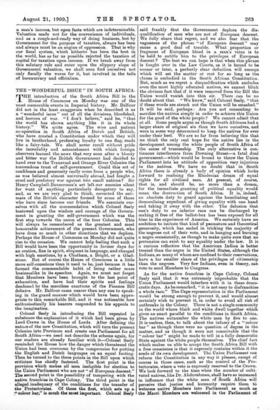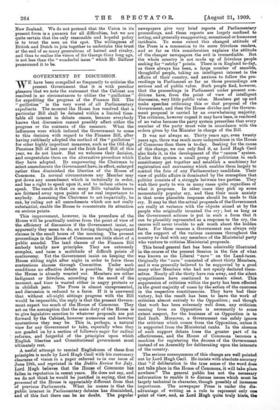THE "WONDERFUL ISSUE" IN SOUTH AFRICA.
THE introduction of the South Africa Bill in the House of Commons on Monday was one of the most memorable events in Imperial history. Mr. Balfour did not in the least exaggerate when he described it as "wonderful issue" out of all the divisions, bloodshed, and horrors of war. "I don't believe," said he, "that the world has shown anything like it in its whole 'history." We quite agree. The wise and patient co-operation in South Africa of Dutch and British, who have created a Constitution under which they will live in brotherhood, professing loyalty to one flag, reads like a. fairy-tale. We shall never recall without pride the incredulity and astonishment with which foreign observers learned the news that very soon after a bloody and bitter war the British Government had decided to hand over to the Transvaal and Orange River Colonies the tremendous trust of self-government. Could this act of confidence and generosity really come from a people who, as was believed almost universally abroad, had fought a cruel and predatory war against two small nations ? Sir Henry Campbell-Bannerman's act left our enemies silent for want of anything particularly derogatory to say, and, as we are very glad to think, corrected the esti- mate of the British character formed by some of those who have since become our friends. We associate our- selves with all the commendation which Colonel Seely bestowed upon the wisdom and courage of the Govern- ment in granting the self-government which was the first step towards the union of the four Colonies. This will always be remembered as the greatest and most honourable achievement of the present Government, who have done so much in other directions that we deplore. Perhaps the House of Commons on Monday did not quite rise to the occasion. We cannot help feeling that such a Bill would have been the opportunity in former days for an oration, fine in spirit, eloquent in language, and charged with high emotions, by a Chatham, a Bright, or a Glad- stone. But of course the House of Commons is a little more self-conscious than it used to be, just because it has formed the commendable habit of being rather more businesslike in its speeches. Again, we must not forget that Members have been brought to the last point of exhaustion, and have had their spirits and feelings deadened by the merciless exactions of the Finance Bill debates. Mr. Balfour came nearer than any one to speak- ing in the grand manner which would have been appro- priate to this remarkable Bill, and it was noticeable how enthusiastically his hearers responded to his appeals to the imagination.
Colonel Seely in introducing the Bill repeated in substance the explanation of it which had. been given by Lord Crewe in the House of Lords. After defining the nature of the new Constitution, which will turn the present Colonies into Provinces and create one Parliament for all South Africa—we need not describe the scheme again, for our readers are already familiar with it—Colonel Seely reminded the House how the danger which threatened the Union had been overcome by the compromise for putting the English- and Dutch languages on an equal footing. Then he turned to the three points in the Bill upon which criticism has chiefly fastened. The first point is the provision which makes all men ineligible for election to the Union Parliament who are not" of European descent." The second point is the possibility of tampering with the native franchise in Cape Colony. The third point is the alleged inadequacy of the conditions for the transfer of the Protectorates. Of these the ret, which sets up a :9‘ colour bar," is much the most important. Colonel Seely said frankly that the Government deplore the dis- qualification of men who are not of European descent. We fully share that regret, and we also fear that the vagueness of the phrase "of European descent" may cause a good deal of trouble. What proportion or fragment of European blood in a man's veins is to be held to entitle him to the privileges of European descent ? The best we can hope is that when this phrase is fought over in the Law Courts, as it is bound to be sooner or later, a perfectly dear definition will emerge which will set the matter at rest for so long as the clause is embodied in the South African Constitution. But, much as we regret a disqualification Which excludes even the most highly educated natives, we cannot blink the obvious fact that if it were removed from the Bill the Union would vanish into thin air, There can be no doubt about that. "We know," said Colonel Seely, "that if these words are struck out the Union will be smashed." It will be said, perhaps : Are you not consenting to sacrifice the natives simply in order to achieve this Union for the good of the white people ? We cannot admit that at all. Some people argue as though South Africans had a larger share of original sin than we have ourselves, and were in some way determined to keep the natives for ever under their heel. We are so far from believing this that we think the only real hope for the native lies in the development among the white people of South Africa of the sense of trusteeship. The only alternative is con- tinuous interference from Downing Street—a fatal dual government—which would be bound to throw the Union Parliament into 'an attitude of opposition very injurious to the natives. We have no doubt that in South Africa there is already a body of opinion which looks forward to realising the Rhodesian dream of equal rights for all civilised men. At present, of course, that is, and should be, no more than a dream, for the immediate granting of political equality would mean the destruction of South Africa. It is, indeed, an absolute duty to guard against the humiliating and. demoralising expedient of giving equality with one hand and taking it away with the other. The delusion that one's duty to an inferior race can be discharged by making it free of the ballot-box has been exposed for all time in the experience of America. We certainly have no ambition to imitate that kind of premature and theoretical generosity, which has ended in tricking the majority of the negroes out of their vote, and in hanging and burning a negro occasionally, as though to make quite sure that no pretension can exist to any equality under the law. It is a curious reflection that the American Indian is better treated than the negro in the United States, although the Indians, so many of whom are confined to their reservations, have a far smaller share of the privileges of citizenship than the negroes. Very few Indians, even in theory, can vote to send Members to Congress.
As for the native franchise in Cape Colony, Colonel Seely said that it was extremely improbable that the Union Parliament would interfere with it in these demo- cratic days. As he remarked, "it is not easy to disfranchise a whole race." The Cape representation in the Parliament would be strong enough to prevent it, and would almost certainly wish to prevent it, in order to avoid all risk of outbreaks in the Colony. There is not a single community in the world where black and white dwell together which gives an exact parallel to the conditions in South Africa. The natives outnumber the white men by five to one. It is useless, then, to talk about the infamy of a "colour bar" as though there were no question of degree in the matter, and as though it were not conceivable that the "colour bar" might be made to tell in a fully democratic State against the white people themselves. The chief fact which makes us able to accept the South Africa Bill with a free conscience is that it expressly contains within it the seeds of its own development. The Union Parliament can reform the Constitution in any way it pleases, except of course in those cases, such as the control of the Pro- tectorates, where a veto is expressly reserved to the Crown. We look forward to the time when the number of culti- vated natives, like Dr. Abduirahman, shall have so increased in influence that the white men of South Africa will perceive that justice and humanity require them to welcome native Members into Parliament as much as the Maori Members are welcomed in the Parliament of New Zealand. We do not pretend that the Union in its present form is a panacea for all difficulties, but we are 'quite certain that the only reasonable and hopeful policy is to trust the men on the spot. The willingness of British and Dutch to join together to undertake this trust at the end of so many generations of hatred and rivalry, and thus to realise the vision of Sir George Grey long ago, is not leas than the "wonderful issue" which Mr. Balfour pronounced it to be.







































 Previous page
Previous page